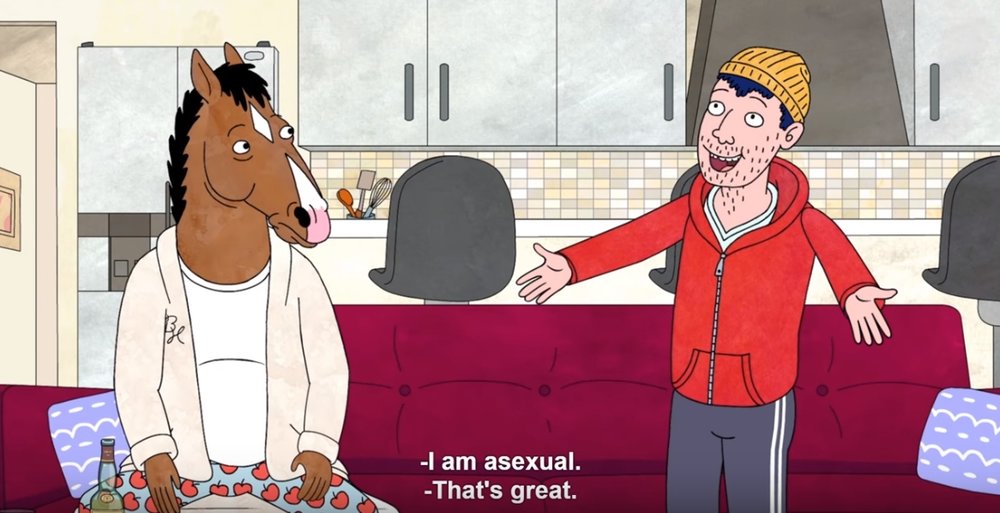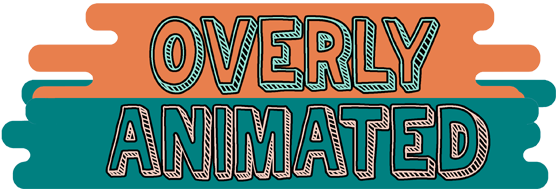Why BoJack Horseman’s Representation of Asexuality is Important
By: Casey Azerty
 Netflix’s BoJack Horseman was quickly put on many people’s radars when the newest season released in September addressed asexuality. During the new season, Todd Chavez explicitly comes out to BoJack saying that he is asexual. As someone who is asexual, this representation means a lot to me. Not only am I actually being represented, but he specifically said the word asexual multiple times. Even though it had seemed the series was building to this scene, I still did not expect it to deliver. It was first indicated during the season three episode “Love And/Or Marriage,” when Todd rejected having sex with his friend, Emily. Initially watching this scene I did not have asexuality on my mind. I just came to terms with the fact that asexuality was something that would never be represented in media. Naturally, I explained it away as Todd likely being interested in another person and feeling like he would be “cheating” on said person if he were to sleep with Emily. But this arc gets a more definitive continuation in the season three finale, “That Went Well,” when Todd tells Emily, “I’m not gay. At least I don’t think I am, but I don’t think I’m straight either. I don’t know what I am. I think I might be nothing.” This scene and everything it stands for took BoJack Horseman from a show I enjoyed to one of my favorite shows of all time. Throughout the yearlong wait for season four, I constantly watched this scene. I rewatched it at least once a week, and more often than not, I cried while watching.
Netflix’s BoJack Horseman was quickly put on many people’s radars when the newest season released in September addressed asexuality. During the new season, Todd Chavez explicitly comes out to BoJack saying that he is asexual. As someone who is asexual, this representation means a lot to me. Not only am I actually being represented, but he specifically said the word asexual multiple times. Even though it had seemed the series was building to this scene, I still did not expect it to deliver. It was first indicated during the season three episode “Love And/Or Marriage,” when Todd rejected having sex with his friend, Emily. Initially watching this scene I did not have asexuality on my mind. I just came to terms with the fact that asexuality was something that would never be represented in media. Naturally, I explained it away as Todd likely being interested in another person and feeling like he would be “cheating” on said person if he were to sleep with Emily. But this arc gets a more definitive continuation in the season three finale, “That Went Well,” when Todd tells Emily, “I’m not gay. At least I don’t think I am, but I don’t think I’m straight either. I don’t know what I am. I think I might be nothing.” This scene and everything it stands for took BoJack Horseman from a show I enjoyed to one of my favorite shows of all time. Throughout the yearlong wait for season four, I constantly watched this scene. I rewatched it at least once a week, and more often than not, I cried while watching.
The wait for season four was tedious, but I was hopeful; I was anticipating where Todd would go next. I started the season, and Todd’s first scene was something of a ‘sequel scene’ to his aforementioned moment in season three. “I want a boyfriend who isn’t asexual,” Emily says to Todd. I gasped when I saw this scene for the first time. They said the word. They said asexual. I was in awe, as even if they decided to go down the asexulaity route this season, I was not expecting them to explicitly say the word asexual. Todd’s arc continued in the third episode, “Hooray! Todd Episode!” After reading the episode title I knew that if the arc continued at any point, this would be the time. Nearing the end of the episode, Todd told BoJack, “I think I’m… asexual.” Todd said that he is asexual in a TV show, a momentous action that I had never experienced prior. I rewatched the scene over and over again throughout the entire day. I could not physically watch the next episode because even when I did not have the episode turned on, I could not stop thinking about the scene. I was crying for a solid half hour. No other scene in all of media comes close to impacting me the way this scene in BoJack Horseman is capable of does everytime I rewatch.
As someone who is asexual, this scene made a world of difference to me. Suddenly I didn’t feel so alone in a world where everyone is expected to have sexual interest. I didn’t feel like I was nothing. I knew that someone who worked on BoJack Horseman was going through the same thing I was going through. I felt validated. As I continue watching, Todd goes to an ‘Asexual Meetup.’ The word ‘asexual’ was written out on screen, and for more than just a frame. It was real. I felt real. During following scenes featuring this meet up, the sign stayed up. In addition, the care for this topic was exemplified even more subtly when a character obstructs the sign, all except for the word ‘Asexual.” Bojack Horseman did something I never thought I would see in any show, and what makes it even more special is that something so personal to me was something that the team was obviously proud of: having underrepresented people be seen.
Todd’s final scene of season four perfectly parallels his final scene in the previous season. In the previous season he feels like he is nothing, and feels alone. However after being asked out by Yolanda, who tells Todd she is also asexual, he suddenly feels like he is not alone. He feels different than he did at the end of season three, even sitting on the opposite side of the same booth. The scene slowly zooms out revealing that everyone in the bar is wearing Todd’s outfit. Todd fits in despite his differences.
Later on, I received a book on asexuality. I sat down with it in a public place on my campus. As I was reading, someone who I never met before came up to me to ask what I was reading. After explaining it was a book on asexuality they asked if I was asexual. I told them yes. They replied with, “A sexual what? Dynamo, deviant? Harassment lawsuit waiting to happen?” Which is exactly what BoJack says to Todd after he officially comes out. I was in shock, I did not expect some random person to know what BoJack Horseman was and to have the exact quote memorized.
It felt to me like the asexuality arc in season four was not for everyone. When I looked online for other viewers’ reactions it seemed like it was an arc that only I could see. The person who noticed my book learned what asexuality was through BoJack Horseman and we continued to have a discussion. I realized that every single day someone was watching BoJack Horseman that has never heard of the term asexuality. I realized that this one show was making a huge impact, not only for me, but for asexual people everywhere. BoJack Horseman helped me realize that I am not alone.
6 Comments

You’re not alone. Thanks for sharing your personal experience with the show. I also never thought I’d see ace/aro actually being talked about in a show, let alone one of the main characters actually being one! This made me so happy <3
I find myself continuing to come back to this article. It is profoundly moving, and showcases a perfect balance between specific in-show examples and a very personal reaction to them. I of course recognize that representation in media is very important, but it never hit me just how much it means on a personal level until I read “The word ‘asexual’ was written out on screen, and for more than just a frame. It was real. I felt real…”
Outstanding.
[…] Why BoJack Horseman’s Representation of Asexuality is Important […]
Thanks for sharing!
This is such an important and personal article, I love it! Representation is important <3
Amazing article! This was really interesting.